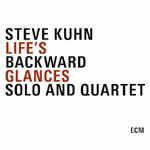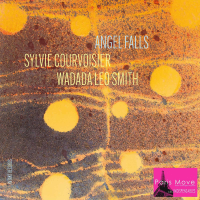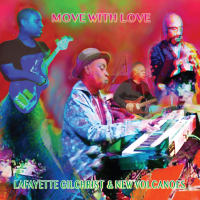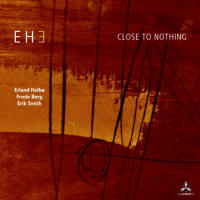Home » Jazz Articles » Extended Analysis » Steve Kuhn: Life's Backward Glances - Solo and Quartet
Steve Kuhn: Life's Backward Glances - Solo and Quartet
This began with the 1974 solo album, Ecstasy—recorded at Eicher's suggestion a day after the session that resulted in the 1975 group record Trance, reissued on CD by ECM in 2005. Kuhn has since released six more discs on ECM over the next three decades, the most recent being Promises Kept (2004), a rare meeting of jazz and strings that avoided all tendencies towards the saccharine while, at the same time, remaining deeply beautiful.
With only three of Kuhn's eight discs available on CD (four counting the limited edition Japanese release of Ecstasy, Life's Backward Glances—Solo and Quartet begins to right a major wrong by making Ecstasy, 1977's Motility with his Ecstasy quartet, and 1980's Playground, with vocal legend Sheila Jordan, available as a three-CD box set, complete with liner notes by Bob Blumenthal. There's considerable cross-over of material; Kuhn's not a prolific writer, but he has managed to turn a relatively small repertoire into a profoundly meaningful one.
With two very different quartet contexts augmenting the solo disc—both featuring a traditional piano-bass-drums foundation, but one featuring woodwind multi-instrumentalist Steve Slagle, and the other with Jordan bring a lyrical interpretation to Kuhn's writing—Life's Backward Glances refracts Kuhn's music through three very different prisms, each with its own set of colors and undeniable charm.
Recorded the day after the sessions for Trance—featuring bassist Steve Swallow, drummer Jack DeJohnette and percussionist Sue Evans—was complete, it's no surprise that Kuhn would revisit some of the same material, but this time in the more liberated context of a solo recording. By this time ECM had almost single-handedly revived the art of solo recording—piano in particular, with seminal entries from Keith Jarrrett (1972's Facing You), Chick Corea (1970's Piano Improvisations Vol. 1 and 1972's Piano Improvisations Vol. 2) and Paul Bley (1973's Open, To Love)—and Kuhn's addition to ECM's canon, not surprisingly, possesses its own unique personality.
Kuhn's writing—always lyrical, sometimes melancholy and always bearing the potential for descent into a tumultuous maelstrom—is a dramatic, swirling chaos but one from which Kuhn invariable manages to escape, returning to the vivid melodies that define his compositions. The opening "Silver" is also performed solo in Trance, but here he extends it to nearly triple the length, beginning in spare impressionism before gradually introducing a kind of flexible time. Dark-hued, Kuhn's free association allows this initially poignant lament to gradually turn more forceful, while never losing its evocative core.
"Prelude in G" is a spontaneous creation yet, much like Jarrett, Kuhn possesses a remarkable ability to pull form from the ether, with a simple arpeggiated pattern gradually dissolving into greater anarchy, building to a turbulent climax that ends almost as suddenly as it begins. "Ulla," which would resurface years later as the title track to his return to ECM, Return to Tomorrow (1996), holds the closest markers to the jazz tradition. At a time when artists were oftentimes turning away from that tradition, for Kuhn it was always a fundamental component of who he was. Still, its changes—linked by passing notes to create a chordal foundation for Kuhn's singable theme—feel somehow inevitable even as they sound new and fresh.
A 12-minute combination of the introspective "Thoughts of a Gentleman" (later revisited as "Gentle Thoughts" on Playground), and even more melancholic "The Saga of Harrison Crabfeathers" (later to become "Poem for No. 15" on Playground), an oblique reference to the tragic plane crash that took the life of New York Yankees catcher Thurston Munson, again visit Kuhn's penchant for moving from impressionism to expressionism, as the violent resonance of "Crabfeathers" continues to descend into greater turmoil, unsettlingly alternating with sudden returns to form. Kuhn's disposition for high drama is marked by a surprising ability to avoid blatant melodrama, instead mining emotions ranging from refined elegance to raw catharsis.
"Life's Backwards Glance"—perhaps Kuhn's most often-recorded original (appearing on Trance, Ecstasy, Playground, Remembering Tomorrow and Promises Kept)—is, like a well-heeled standard, a song that provides expansive grist for constant reinterpretation. It's also one of a number of songs that, while interpreted here instrumentally, have provided Kuhn a vehicle for his poetic muse. A rubato tone poem on Trance, a day later it becomes a stream-of-consciousness forum for Kuhn, while ultimately evolving into a similar space, Kuhn's virtuosic cascading lines creating the same sense of power that it took an entire rhythm section to evoke on Trance.
Motility debuts Kuhn's working band Ecstasy, featuring saxophonist and flautist Steve Slagle, bassist Swartz (later to become simply Harvie S.) and drummer Michael Smith, who would be replaced by Bob Moses for the group's follow-up, 1978's Non- Fiction. While working in a group context inherently imposes certain structural necessities, Ecstasy managed to retain much of the temporal elasticity and broader impressionistic ambience of Kuhn's solo effort. While everyone shines on Motility—perhaps most notably Smith, if only because he's as paradoxically powerful yet empathically sensitive as other drum mainstays of the label at that time (DeJohnette, Jon Christensen and Michael DiPasqua), who after this recording appears to have disappeared off the face of the planet—but more in the "everyone soloing and nobody soloing" manner that the late Joe Zawinul used to describe his longstanding group, Weather Report.
That said, other than a collective approach to interpreting Kuhn's six compositions and Swartz's two, there's little to link Ecstasy with Weather Report—even the early, more spontaneously improvisational version responsible for the 1971 self-titled debut and 1972's I Sing the Body Electric, both on Columbia/Legacy. Kuhn's ability to evoke vivid imagery hits with the album opener, the aptly-titled "Rain Forest," where Kuhn's delicate pianism interacts with Slagle's flute to create a cinematic vision, Swartz's deep arco anchoring this rubato excursion into collective interaction. "Oceans in the Sky" is more dramatic, an ideal follow-on to "Rain Forest," that takes similar ideas and infuses them with greater power, as Smith's dry cymbal work and fervent rolls around the kit create a paradoxically ethereal yet unmistakable sense of forward motion that, coupled with Kuhn's cascading lines, conjures up images white-capped waves. Slagle, this time on soprano sax, provides the melodic strength even as he plays with Dave Liebman-esque energy and expressionism.
Swartz, who would also appear on ECM with his own collaborative group Double Image for its sophomore release, Dawn (1979), would go on to focus his energies on Latin jazz, but here—as well as on a series of duet albums with Jordan that took place after their first encounter in Kuhn's group on Playground and its follow-up, the live Last Year's Waltz (ECM, 1982)—he's more stylistically expansive. He's also far more than a rhythmic anchor in a group that encourages interplay and democracy. His two compositional contributions to Motility—the bold yet lyrical "Catherine" and high velocity album closer, "Places I've Never Been"—a burning samba that foreshadows things to come—demonstrate an already well-developed writer (he was under 30 at the time of this recording), and a virtuoso player capable of blinding speed who, rather than using it as an end unto itself, never abandons finding imaginative expansions on the essence of song.
The collaborative nature of Motility doesn't mean there aren't impressive solos peppered throughout the disc. Both Kuhn and Swartz deliver fiery solos on "Places I've Never Been," while Slagle is at his hottest on "Bittersweet Passages," where the solo may revolve around a pedal point, but the saxophonist moves in, out and around that sparest of contexts to create a solo of surprising invention. Swartz also takes an impressive solo on Kuhn's wry "Deep Tango," before the pianist's own solo cleverly juxtaposes near chaos with potently romantic melodicism.
Stormy weather also imbues the high energy title track, which ultimately swings hard, once again referencing Kuhn's unmistakable roots in the jazz tradition. So, too, does the disc's one solo piano piece, "A Danse for One," which is filled with skewed and direct references to blues and barrelhouse, all the while feeling completely connected to the rest of the album, as the pianist shifts from the straightforward to the anarchic at the drop of a dime.
As strong as Trance is, there's more of a group feel about Motility, perhaps because Kuhn, Slagle, Swartz and Smith had already been working together as a unit prior to its recording. It's a strong debut, but Non-Fiction edges it out by a nose, and hopefully will receive similar reissue treatment before too long.
Kuhn may have managed to get one example of his odd poetry out on Trance ("Life's Backward Glance"), and had already recorded an album with Karin Krog singing a number of his songs (We Could Be Flying, P-Vine, 1974), but it wasn't until he took his group with Swartz and Moses, and replaced Slagle with Sheila Jordan, that he was able to record an entire album devoted to his music and lyrics. Four of the tunes had already appeared on previous ECM discs—"Gentle Thoughts" (as "Thoughts of a Gentleman"), "Poem for No. 15" (as "The Saga of Harrison Crabfeathers"), "Deep Tango" and the perennial "Life's Backwards Glance." But the two other tracks on Playground—"Tomorrow's Son" and "The Zoo"—had past lives under different names as well. But with the inclusion of a vocalist, Kuhn's approach to the material had to change significantly, most notably with a firmer, more clearly defined pulse—at least during the passages where Jordan was singing.
Kuhn's lyrics ranged from the absurd ("The Zoo") to the more personal ("Tomorrow's Son," "Thoughts of a Gentleman"), the latter relating to a time in his life where, as he confesses in the liner notes, following the end of a love affair with Swedish singer Monica Zetterlund, Kuhn was "a very unhappy young man." Still, while Kuhn will undoubtedly be remembered more for his music than his lyrics, the stream of consciousness nature of some of his poetry is compelling enough, and certainly substantial enough to give Jordan, a deeply expressive singer, plenty to work with.
Despite the inherently more structured form of Playground, when Jordan sits out and the trio gets the chance to expand, there's plenty of the bold impressionism and powerful drama of the trio's work in Ecstasy. "Gentle Thoughts" may largely be a ballad, but its ending is filled with the same turbulence as that found on other discs in the set, just performed in a more controlled fashion.
The group also swings more, and while ECM at that time in particular was known for its almost intentional avoidance of such traditional markers, in the context of Kuhn's music it worked because it was only a part of what he was doing. Still, "Gentle Thoughts," which begins as a rubato duet between Kuhn and Jordan that finds the singer at her subtlest and most nuanced, ultimately kicks into an amiable, mid- tempo swing for Kuhn's lazy, behind-the-beat solo that's sparer and more percussive than usual as Jordan occasional joins in for some in tandem improvisation.
Swartz's opening solo on "Poem for No. 15" leads into a duet with Jordan that may well have been the germination of future, more exclusive duet efforts. Regardless, the song ultimately morphs into another example of Kuhn's ability to create dynamic juxtaposition, impressively bolstered by Swartz and Moses, who again act as equal partners rather than simply supporting roles. "Deep Tango" receives a lengthier treatment than on Motility, with Jordan's wry delivery matching Kuhn's clever lyrics and the trio's buoyant performance. Curiously, while Kuhn's lyrics to "Life's Backward Glance" on Trance take the form of a spoken word narrative that sets up the music to follow as a story to be told, here it's done in reverse—the instrumental intro takes up more than half the tune's five minute duration, with Jordan entering close to the song's end with a completely different set of lyrics that more directly address its title.
The group's follow-up, which, like Non-Fiction, will hopefully see first-time issue on CD as well before long, changes the complexion—a set of ten tunes, only half of which are Kuhn's—making Playground significant as the only album to focus exclusively on the pianist's music and lyrics. Playground's exclusivity also makes it the perfect match for Motility and Ecstasy. Combining these three albums in one box undeniably helps get out some of ECM's remaining discs yet to see the light of day on CD. But it's the box's emphasis on Kuhn the writer that makes Life's Backward Glances—Solo and Quartet an important release that will introduce an significant aspect of Kuhn's talent to an audience largely unaware that he's far more than a relentlessly talented interpreter of other peoples' material.
Track Listing
CD1 (Ecstasy): Silver; Prelude in G; Ulla; Thoughts of a Gentleman/The Saga of Harrison Crabfeathers; Life's Backward Glance. CD2 (Motility): The Rain Forest; Oceans in the Sky; Catherine; Bittersweet Passages; Deep Tango; Motility/The Child is Gone; A Danse for One; Places I've Never Been. CD3 (Playground): Tomorrow's Son; Gentle Thoughts; Poem for No. 15; The Zoo; Deep Tango; Life's Backward Glance.
Personnel
Steve Kuhn
pianoSteve Kuhn: piano; Steve Slagle: soprano and alto saxophones (CD2), flute (CD2); Harvie Swartz: double-bass (CD2, CD3); Michael Smith: drums (CD2); Sheila Jordan: voice (CD3); Bob Moses: drums (CD3).
Album information
Title: Life's Backward Glances - Solo and Quartet | Year Released: 2009 | Record Label: ECM Records
Tags
PREVIOUS / NEXT
Support All About Jazz
 All About Jazz has been a pillar of jazz since 1995, championing it as an art form and, more importantly, supporting the musicians who make it. Our enduring commitment has made "AAJ" one of the most culturally important websites of its kind, read by hundreds of thousands of fans, musicians and industry figures every month.
All About Jazz has been a pillar of jazz since 1995, championing it as an art form and, more importantly, supporting the musicians who make it. Our enduring commitment has made "AAJ" one of the most culturally important websites of its kind, read by hundreds of thousands of fans, musicians and industry figures every month.






















